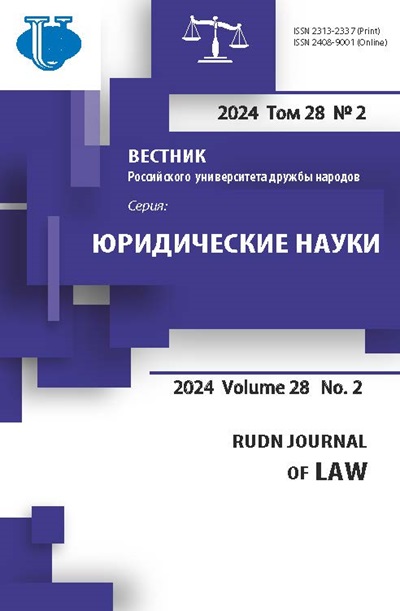The evolution of digital legal proceedings in African countries: Nigeria, Egypt and South Africa in the focus
- Authors: Rusakova E.P.1,2
-
Affiliations:
- RUDN University
- Vladivostok State University
- Issue: Vol 28, No 2 (2024)
- Pages: 424-435
- Section: PROCEDURAL LAW
- URL: https://journals.rudn.ru/law/article/view/39499
- DOI: https://doi.org/10.22363/2313-2337-2024-28-2-424-435
- EDN: https://elibrary.ru/KDIZKD
- ID: 39499
Cite item
Full Text
Abstract
The adoption the Digital Transformation Strategy for 2020-2030 by the African Union stands out as a significant milestone in advancing digital agendas and programs across African countries. The integration of digital technologies into the society and economy is acknowledged as a catalyst for fostering innovative, inclusive and sustainable growth. Formulated upon existing ICT initiatives in Africa, this strategy not only holds socio-economic importance for the continent’s development by also play a pivotal role in ensuring digital governance. African countries grapple with challenges such as unemployment, poverty, and digital divide, making the coordinated policy of all states critical for the successful realisization of the digital strategy. Essential components include adequate financing, regional integration, international cooperation and harmonization. The digital transformation of justice holds the potential to address various issues concerning accessibility and efficiency of the judicial method of safeguarding the rights and legitimate interests of citizens and business entities. A notable concern is the lack of trust in the judicial system by over 53% of Africans, emphasizing the need for improvements in legal systems to combat delays, corruption, and hight litigation costs. Moreover, the digital gender gap poses a particular challenge, with only 24% of women in Africa having access to the Internet. Rural women, facing additional societal barriers, encounter difficulties in accessing legal aid, property and economic opportunities. Leveraging digital technologies to enhance justice systems, including through remote court participation and electronic case management, can mitigate these challenges. By facilitating gender-inclusive access to justice, reducing costs and processing time, and enhancing overall judicial efficiency, digital transformation in the realm of justice may pave the way for more equitable legal processes. The theoretical and methodological foundation of the study is rooted in a dialectical approach to understanding social processes and legal phenomena. The objectives of this study also necessitate application of a number of general scientific methods. Methods of analysis and synthesis are employed to examine legal trends in the progression of electronic justice, as well as to compare the evolution of digital justice in Egypt, Nigeria, and South Africa. The unique characteristics of the study’s object - civil legal relations emerging during the exrercise of the right to judicial protection in electronic format - also require the use of private law methods.
About the authors
Ekaterina P. Rusakova
RUDN University; Vladivostok State University
Author for correspondence.
Email: rusakova-ep@rudn.ru
ORCID iD: 0000-0001-6488-0754
SPIN-code: 5995-0005
Scopus Author ID: 57192093101
Doctor of Legal Sciences, Associate Professor, Full Professor of the Department of Civil Law and Procedural Law and Private International Law, Law Institute, Peoples’ Friendship University of Russia (RUDN University); Leading Researcher, Vladivostok State University
6 Miklukho-Maklaya str., Moscow, 117198, Russia Federation; 41 Gogolya str., Vladivostok, Primorsky Territory, Far Eastern Federal District, 690014, Russian FederationReferences
- Abd-Elkawe, M. Kh., Belal M.A. & Abd-Elwahab, A.M. (2023) An Adaptive Framework for Electronic Litigation in Egypt. International Journal of Computer Applications. 184(42), 18-27. https://doi.org/10.5120/ijca2023922521
- Bashilov, B.I. & Berman, A.M. (2022) Procedural Documents in the Era of New Technologies: How Legal Design Has Changed the Legal World. Smart Innovation, Systems and Technologies. (288), 261-270. https://doi.org/10.1007/978-981-16-9808-8_28
- Bezbakh, V.V. & Frolova, E.E. (2022) Augmented Reality and Civil Law Regulation of Business Relations. Smart Innovation, Systems and Technologies. (254), 29-37. 29-37. https://doi.org/10.1007/978-981-16-4621-8_3
- Frolova, E.E. (2020) The new European Union financial market ecosystem: digitalization and sustainability. RUDN Journal of Law. 24(3), 673-694. https://doi.org/10.22363/2313-2337-2020-24-3-673-694 (in Russian).
- Hassan, M., Rabie, M.A. & Khaled, A. (2020) Electronic litigation in light of Act No. 146 of 2019. Amending some provisions of Economic Courts Act No.12 of 2008. Available at: http://sapegyptlaw.com/146-of-2019.html. [Accessed 9th March 2024].
- Kadry, S. (2021) Egypt: Egypt’s First Ever Litigation Electronic Registry. Available at: https://www.mondaq.com/trials-appeals-compensation/1040896/egypt39s-first-ever-litigation-electronic-registry [Accessed 9th March 2024].
- Mabeka, N.Q. (2021) An Analysis of the Implementation of the CaseLines System in South African Courts in the Light of the Provisions of Section 27 of the Electronic Communications and Transactions Act 25 of 2002: A Beautiful Dream to Come True in Civil Procedure. Potchefstroom Electronic Law Journal. (24), 1-31. https://doi.org/10.17159/1727-3781/2021/v24i0a8707
- Nombulelo Queen Mabeka, & Rushiella Songca. (2021) An Overview of Statutes Relating to Civil Procedure in South Africa in Light of the Changes in Technology. Obiter. 41(4), 685-703. https://doi.org/10.17159/obiter.v41i4.10476
- Nwaeze, G. (2020) The Future of Law Practice in Nigeria in the Face of Global Trends and Developments in Information and Communications Technology. Available at SSRN: https://ssrn.com/abstract=3596499/ [Accessed 9th March 2024].
- Olugasa, O., & Davies, A. (2022) Remote Court Proceedings in Nigeria: Justice Online or Justice on the Line. International Journal for Court Administration. 13(2). https://doi.org/10.36745/ijca.448
- Rusakova, E.P., & Frolova, E.E. (2019) Procedural Aspects of Proof in China’s Internet Courts: Opportunities for Receiving BRICS Jurisdiction. Lecture Notes in Networks and Systems. (198), 1598-1605. https://doi.org/10.1007/978-3-030-69415-9_176
- Rusakova, E.P. & Frolova, E.E. (2021) Procedural Aspects of Proof in China’s Internet Courts: Opportunities for Receiving BRICS Jurisdiction. In: Modern Global Economic System: Evolutional Development vs. Revolutionary Leap. Institute of Scientific Communications Conference. Vol. 198. Cham: Springer Nature, 1598-1605. https://doi.org/10.1007/978-3-030-69415-9_176
- Rusakova, E.P. & Frolova, E.E. (2022) Current Problems of Digital Justice in the BRICS Countries. Smart Innovation, Systems and Technologies. (254), 143-153. https://doi.org/10.1007/978-981-16-4621-8_12
- Shima, V.A. & Esq, B.A. (2017/2018) Electronic Filing and Service of Court Processes under the National Industrial Court Rules, 2017 and Court of Appeal (Practice Directions), 2014: A Catalyst for Trial within a Reasonable Time in Nigeria. Benue State University Law Journal. 298-313. Available at: https://www.bsum.edu.ng/w3/files/lawJournal/vol8n1/article13.pdf [Accessed 9th March 2024].
Supplementary files















